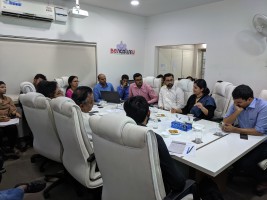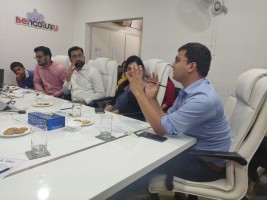“Regulatory Ecosystem in Bengaluru Mobility – Round Table”
Over the last decade, there has been a phenomenal growth in the population of vehicles in Bengaluru. There are multiple regulatory challenges that prevent the new mobility service providers to offer sustainable mobility solutions in India. The Motor Vehicles Act specifies two kinds of permits fortransport operators – stage carriage and contract carriage, which has to lead to a number of issues that vary from state to state.
The regulations in the state of Karnataka have created bottlenecks for service providers in the space of ride-sourcing, ride splitting, ride-sharing, and bike, cycle, and car-sharing models.
The major regulatory bottlenecks in Bengaluru include – fare cap and no surge pricing, restrictions on shared cabs ad shared autos, no policy for carpooling and bike taxis among others.
With this background, B.PAC and Uber under its initiative on " Sustainable Mobility for Bengaluru" organized a roundtable discussion titled ‘Regulatory Ecosystem in Bengaluru Mobility’ on September 6th, 2019 at the B.PAC office. The discussion had representation from major stakeholders 1in the sectors mentioned above, highlighting important bottlenecks and challenges in the regulatory system in Karnataka.
The major points during the discussion can be classified under the following themes:
-
Power shared between Centre and State Government
- The Central Government should provide clarity in terms of carpooling and shared mobility since the States have a very limited role to play in these.
- The policies and missions which have been passed by the Centre till date are more focussed towards four-wheeler. For all the concerns related to two-wheelers, the state government is held responsible. Considering two-wheelers have grown over the last decade, certain clarity on two-wheeler policies have to be brought in by the Centre.
-
Motor Vehicles Act and Motor Vehicles Amendment Act 2019
- The Amendment Act has not clearly defined aggregators, still leaving it ambiguous and vague.
- In the Central Motor Vehicle Act, any violation of traffic rules is booked to the RC number (owner of the vehicle) and not to the rider (license number). Therefore, the aggregator who offer rental bike and car services, get fined instead of the rider. Further, with the increase in fines owing to the MV Amendment, the rental aggregators are under threat. The state governments should provide a provision of transfer of fines to the consumer committing the violation.
-
Carpooling and Shared mobility incentivization
- There is no clear definition of carpooling in Karnataka or any other state. The government must define “hire and reward” as mentioned in the MV Act.
- Incentivizing shared mobility services is crucial for India:
- Providing parking priority to shared mobility options over private vehicles. Case of Sao Paulo where half parking in the city is given to shared mobility options. Through this initiative, the government can earn revenue and invest the money back into public transport options.
- Geofencing rule needs to be brought in which regulates the pickup and drop off points for shared transport options.
- In the Central Motor Vehicle Act, any violation of traffic rules is booked to the RC number (owner of the vehicle) and not to the rider (license number). Therefore, the aggregator who offer rental bike and car services, get fined instead of the rider. Further, with an increase in fines owing to MV Amendment, the rental aggregators are under threat. The state governments should provide the provision of transfer of fines to the consumer committing the violation.
-
Data Sharing
- Data sharing has become the need of the hour. The data owned by the aggregators can be used for infrastructural development such as Transit-Oriented Development (TOD) among others.
- The issue with data sharing could be associated with sharing of the data with public authority. A middle ground must be struck where organizations can share data with the government and be protected.
- An umbrella organization needs to be conceptualized under Transport Department, GoK, where all the available data with aggregators could be used to make a case to the Government to show how the aggregators are creating newer mobility options
-
Regulatory sandbox and NMTA
- The term regulatory sandboxes emerged to refer to a special set of rules that encourages innovative companies to test their products and services in a controlled environment. Post such phase of testing, the resultant solution may either be done away with or if it is successful then it may be introduced to consumers, without restrictions on regulations.
- A proposal for Karnataka Innovation Authority was made which will follow the regulatory sandbox option for any law that Karnataka Government has the constitutional power to change. This will create a conducive environment for startups for innovations in the mobility solutions
- Non-Motorized Transport Authority (NMTA) has been proposed to identify infrastructure required for cycling and walking in the city
-
Fare cap and dynamic pricing
- Bengaluru has both an upper and lower cap on prices. This restricts their ability to large consumers based on market forces. A driver in Bengaluru earns less than his counterparts in different cities because of the fare cap.
- This leads to a vicious cycle where the earnings potential in Bangalore for drivers is less, because of which the job is less attractive which causes a lesser supply of cars for consumers. Drivers in Bengaluru find it less attractive to take up the job as the price caps are affecting their earning potential.
- The fare caps are limiting driver earnings in peak hours as there is no time-based pricing. The driver uses more fuel and time in peak hours but cannot pass that on to the consumer.
- The fare caps and lack of time-based fares are unique to Bangalore. The distance-based pricing only operates on fuel cost. It does not cover labor etc. need of time bases pricing which Delhi and Mumbai follows
The roundtable discussion organized by B.PAC and UBER provided a platform for the stakeholders to put forth their points on the regulatory challenges that restrict their operations in the state of Karnataka.


Candid shot during the Regulatory Ecosystem in Bengaluru Mobility roundtable at B.PAC office.
